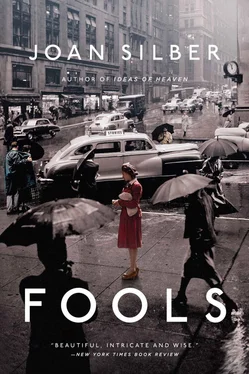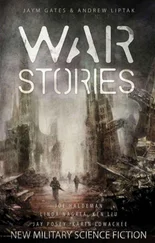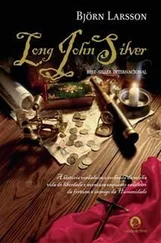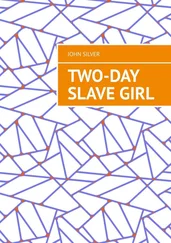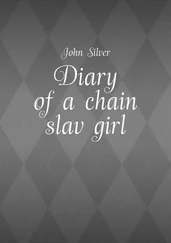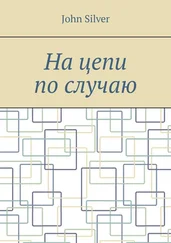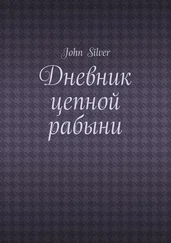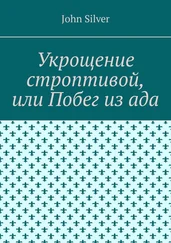At work I did a feature with a reporter who wrote about the resourcefulness of the homeless. I had been waiting for an assignment like this. I got shots of a man who’d trained his dog to panhandle with a cup tied to its paw, a guy in a wheelchair who’d rigged up a Mylar umbrella for an awning, a mother washing dandelion greens in a fountain to feed to her kids. I kidded around, I thanked them for their time. Some of them wanted a little payment — which we weren’t supposed to give as journalists — and some of them were embarrassed by all of it.
The photos had respect in them, I didn’t make them cloying. I could do that much. Adinah said, “Excellent work,” which pleased me greatly. She of all people could see why I wanted to remind the public that the unmoneyed were actually real humans.
She looked trim and healthy these days, in her jeans and her striped polos, with more color in her face. All that dog-walking was doing her good. Oh, yes, she was thinking of branching out and starting her own walking service. Adinah as an entrepreneur? “Not just me,” she said. “With someone.”
Her co-walker was a guy named Marty, who answered the door to the apartment one morning when I showed up — a tall guy with hair like a big black mop. Okay, I didn’t like him, how could I? Becky was clambering all over him, giggling. He was no mere business acquaintance. Adinah was still in her bathrobe. “’Morning, man,” he said to me. He called Adinah “Deen,” he called Becky “Beck.” Who the hell did he think he was?
“You think you’re going to get rich leading mutts around?” I asked Adinah. “You think there’s big bucks in dog shit?”
And he was there almost every time I came by. In her days with me, Becky liked to talk about how Marty could whistle any tune, how Marty told her stories about all the dogs. Itchy and Doodlehound and Fatface, he called them. I was paying rent so this sucker could sleep in my bed? Adinah said, “What do you care? He doesn’t live here.” If he ever moved in, I didn’t see it, because I had trouble showing up as often. It just wasn’t very pleasant to see how the waters had closed over what had once been my spot.
I got offered a job in New York, a city I always liked, and it was better for everyone this way. I had Becky in the summers. Not every summer (I said no a few times) and not all summer, but we had a great August in the Catskills when she was six and she really liked her Brooklyn day camp when she was eight and she was in a great help-clean-up-the-parks program when she was in middle school.
When Becky was twelve, Adinah switched to another Sufi group — she liked the leader better, he gave great talks, they had better music — and this group had kept its ties with Islam. My ex-wife was becoming a Muslim! “It’s kind of great,” she said. Fine with me. So when Becky spent her summers with me, did she have to be taken to a mosque? There was some discussion of this — was there even the right kind of mosque anywhere near me? actually, there was — and finally Becky was asked what she wanted, which was to be exclusively in Dad-land when she was with Dad. Later for the Sufis.
A girlfriend I had at the time was spooked by the mosque thing. “So what are they telling your kid in there? And she has a Jewish father! Do they even know that?” That girlfriend didn’t last long. I did try to ask Becky what they were telling her in there. “Oh, you know,” she said. “The Unity of Being stuff. Opening the heart. The old usual.” She seemed to just take it for granted, one more thing the grown-ups invented. “And there’s prayers, of course.” What she liked to do with me was go to Burger King, since cheeseburgers were not served at home. We went to horror movies together too, a favorite illicit activity. And she had friends from her park camp, nice girls from what our mayor liked to call the gorgeous mosaic of our diverse city.
What did I really think? Part of me thought Adinah was just filling her vacant life (the Marty guy was long gone, the dog-walking had to be a job with limited satisfactions) and part of me envied her. I was a serious person in my own way, but I’d stopped considering the unseen and how to work with it. I didn’t have what Adinah had, a capacity for devotion and a thirst to soar, an instinct for flight. I didn’t think she was crazy (were a billion Muslims in the world crazy?), but her parents must have thought that, if they even knew. They probably didn’t know.
And I’d been to Muslim countries, by this time, once to photograph a famous slum in Cairo and once for a trade conference in Jakarta. In both places I heard by-the-by invectives against Israel and the Jews from locals chatting me up, and I’d kept my mouth shut about being Jewish. Which I later felt creepy about, although as a photojournalist I kept my mouth shut about a lot of things. But would I have been any happier if Adinah had converted to Catholicism or gone to live in an ashram or meditated with the Dalai Lama? The great chasm would still have been there, between the realms where our gazes were fixed. Between us.
Over the years friends had asked if Adinah and I might get back together and I’d always said no. That was over. No pennies left in that piggy bank. We were, of course, tied forever by Becky. Sometimes I had daydreams of us in the same apartment again, back at the Door, and both of us better at it this time. You never forget certain years of being young. Not that I hadn’t fallen for other women — I’d had some long intrigues and some very hot flashes-in-the pan — but Adinah turned out to be my big deal. Who knew?
Maybe Adinah was going to meet a nice fellow at the mosque. I knew they sat apart, men and women, but somebody’s brother? I tried feeling out Becky on this — were there committees her mom was on, were there bake sales or festivals or fund-raisers? Becky said, “It’s too boring for me to know.” I said, “I met your mom watching dervishes, did you know that?” “No,” she said.
But I was the one who met somebody at a mosque. I was photographing an East Village mosque in a plain storefront building on First Avenue, for an article on flourishing traditions in the Big Apple. They paired me with a reporter named Frances, a go-getter who was very good at chatting up all the Bangladeshi and Bengali cabdrivers who left their shoes on shelves in the hall (I got a good shot of the shoes) before they went in to pray. She had an interview with the council president, in his endearingly crummy office, and drew out some quotable stuff from a Nigerian woman with five kids and a teenager with parents from Kolkata. Afterward we stuffed ourselves on smoky chicken and onions from the halal food cart across the street. She interviewed the cart guy too, who was Moroccan.
She had short hair that was dyed too streaky and a funny, rough voice. When I said, “This is a lot less trouble than covering the guy who threw his mother down the elevator shaft,” she laughed so easily I thought, Oh, she likes me . I started telling her about that story — the mother was not a nice person — and she said, “Please. I had the one where a middle school kid stole crack from a teacher.” The conversation seemed very comradely to the two of us.
She was closer to my age than I’d thought at first. She had a son older than Becky, she’d grown up in Staten Island, she had a brother who was a priest, and by the time I drove us back to the newsroom, we both knew something was starting between us.
Frances was my big stroke of luck. She was not simple to be with (full of opinions she wouldn’t let rest), and during our first six months together she could never stay over because her boy was still in high school, but she was my best idea yet of who to love. Even Becky, who took a whole summer to come around, said, “Frances knows what’s going on.” Aside from her sex appeal, Frances was what my mother used to call a good egg. Once we got over some of the initial stupidities and misfirings, we were kind of dazzling as a couple.
Читать дальше
